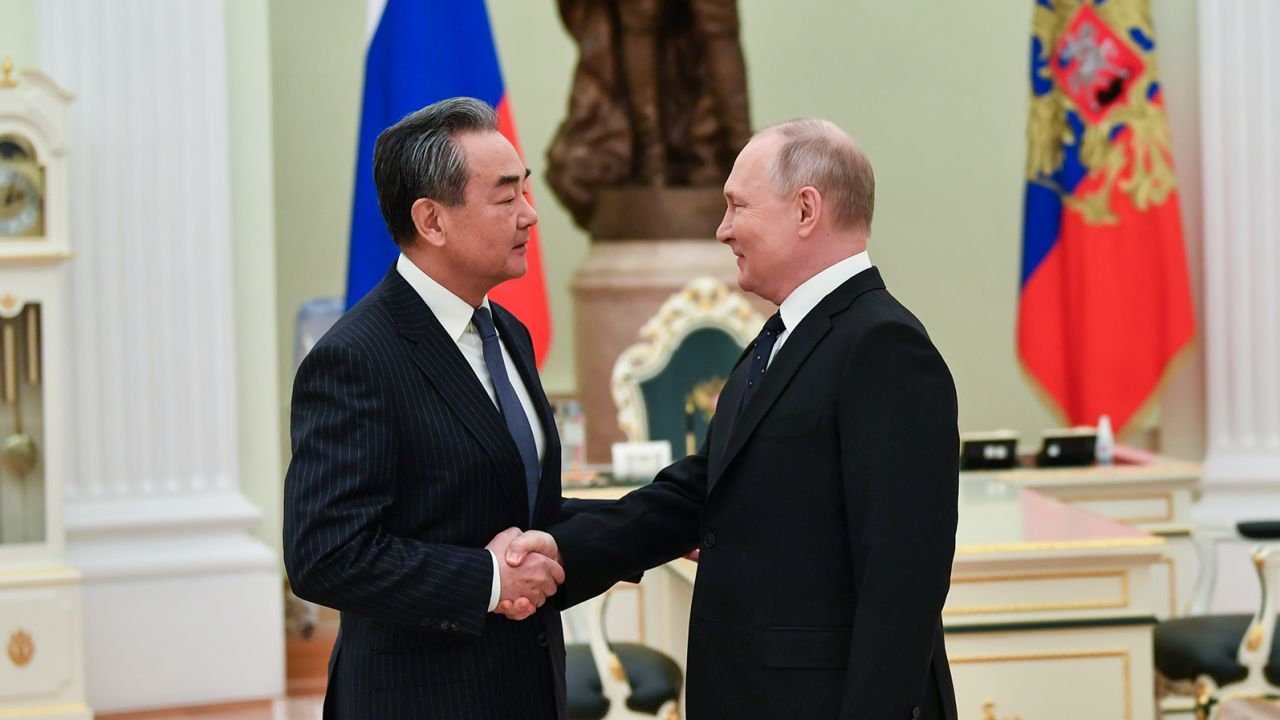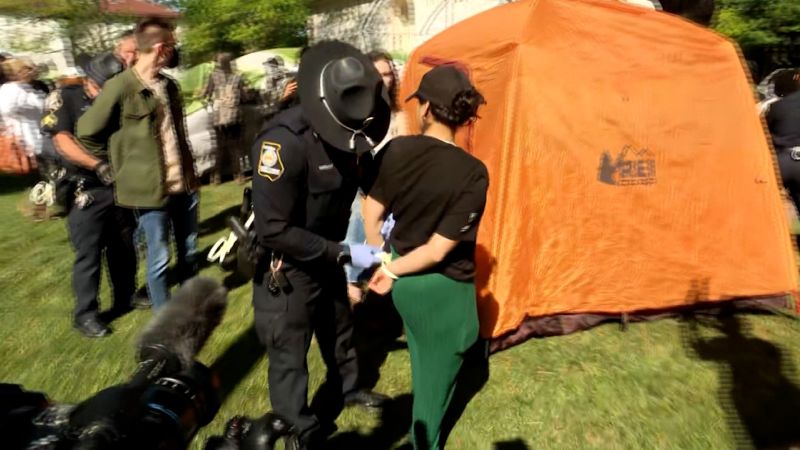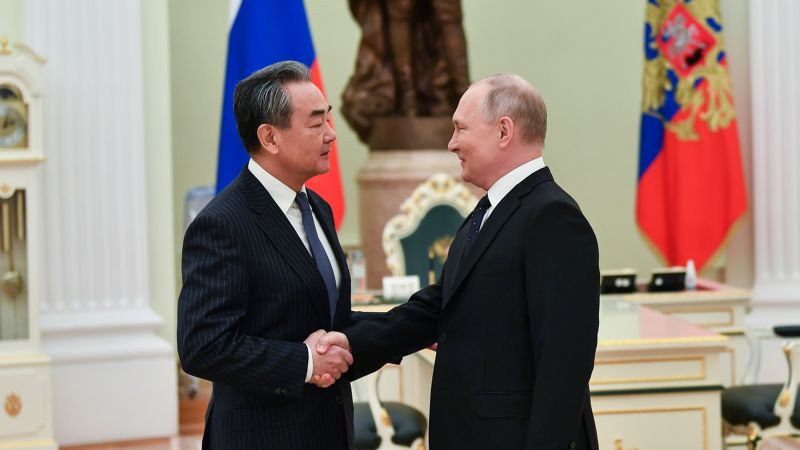CNN
—
China has reiterated its calls for a political settlement to the Ukraine conflict on the one-year anniversary of Russia’s invasion, as Beijing comes under increasing pressure from the United States and its allies over its growing partnership with Moscow.
In a newly released position paper Friday, China’s Foreign Ministry called for a resumption of peace talks, an end to unilateral sanctions, and stressed its opposition to the use of nuclear weapons.
“Conflict and war benefit no one. All parties must stay rational and exercise restraint, avoid fanning the flames and aggravating tensions, and prevent the crisis from deteriorating further or even spiraling out of control,” the paper said.
The 12-point document is part of Beijing’s latest efforts to present itself as a neutral peace broker, as it struggles to balance its “no-limits” friendship with Moscow and fraying relations with the West as the war drags on.

But Beijing’s claim to neutrality is severely undermined by its refusal to acknowledge the nature of the conflict – it has avoided calling it an “invasion” – and its diplomatic and economic support to Moscow.
Western officials have also raised concerns that China may be considering providing Russia with lethal military assistance, an accusation denied by Beijing.
The position paper is mostly a reiteration of China’s existing position, which includes urging both sides to resume peace talks. “Dialogue and negotiation are the only viable solution to the Ukraine crisis,” it said, adding that China will play a “constructive role,” without offering details.
The document also said “the sovereignty, independence and territorial integrity of all countries must be effectively upheld,” but did not recognize Russia’s violation of Ukraine sovereignty, or even mention the word “invasion.”
In a thinly veiled criticism of the US, the paper said “Cold War mentality” should be abandoned.
“The security of a region should not be achieved by strengthening or expanding military blocs. The legitimate security interests and concerns of all countries must be taken seriously and addressed properly,” it said, apparently echoing Moscow’s view that blames the West for provoking the war through the expansion of NATO.
It also appeared to criticize the wide-ranging economic sanctions imposed by the US and other Western countries on Russia. “Unilateral sanctions and maximum pressure cannot solve the issue; they only create new problems,” it said. “Relevant countries should stop abusing unilateral sanctions and ‘long-arm jurisdiction’ against other countries, so as to do their share in deescalating the Ukraine crisis.”
The paper stresses China’s opposition to the use of nuclear weapons – a stance Chinese leader Xi Jinping communicated to Western leaders last year.
“Nuclear weapons must not be used and nuclear wars must not be fought. The threat or use of nuclear weapons should be opposed. Nuclear proliferation must be prevented and nuclear crisis avoided,” it said.
It also warned against armed attacks against nuclear power plants or other peaceful nuclear facilities.
Russian President Vladimir Putin’s nuclear saber rattling during the war has alarmed the US and its allies, though officials have repeatedly dismissed the moves as empty threats. In December, Putin warned of the “increasing” threat of nuclear war, and last month, Dmitry Medvedev, deputy head of Russia’s Security Council, threatened that Russia losing the war could “provoke the outbreak of a nuclear war.”
China’s position paper was first discussed last week by top diplomat Wang Yi at a security conference in Munich, as he attempted to cast Beijing as a responsible negotiator for peace during a diplomatic charm offensive in Europe.
But speaking before the paper was released, experts who have long followed China-Russia relations said they expected little substance from the document, citing Beijing’s limited room for maneuver.
Alexander Gabuev, a senior fellow at the Carnegie Endowment for International Peace, said China doesn’t have the “pluralistic tools” required to negotiate a ceasefire.
“China (doesn’t) really have a big sway over decision making in the Kremlin, they’re clear-eyed about Putin’s obsession,” he said, adding that Chinese officials also “definitely have no say over Kyiv and friends of Kyiv.”
“My sense was that the European officials are pretty clear-eyed about what China is trying to do. And they are also kind of skeptical and not buying into this,” he said.
But Beijing’s efforts to present itself as a peace broker would help show the Global South an image of China as a responsible, great power, in contrast to a US that – in Beijing’s words – is “adding fuel to fire,” Gabuev said.
Li Mingjiang, an international relations expert at S. Rajaratnam School of International Studies in Singapore, said pressure from the US and its allies, especially European powers, was the main motivation for Beijing to release the position paper.
“It’s unlikely that China in the near future will be prepared to play a substantive mediation role. It’s just very difficult for China to work on this because Beijing has to be very cautious to some of the concerns of Russia,” he said.
“When you get into a mediation role, inevitably you have to express some position on some of the very thorny issues like Crimea and the eastern part of Ukraine,” Li said, referring to the Ukrainian peninsula annexed by Moscow and parts of Ukraine occupied by pro-Russia forces since 2014.
Expressing such a position could end up upsetting Moscow or make it feel like “a betrayal of Russia,” he added.
For now, both Russia and China have been eagerly showcasing the strength of their close relations.
Wang visited Moscow as the final stop of his European tour, and met with Putin on Wednesday.
Putin, who welcomed Wang with outstretched arms as the Chinese diplomat entered the meeting room, said relations between Russia and China are “reaching new milestones.”
“Russian-Chinese relations are developing as we planned in previous years. Everything is moving forward and developing,” Putin told reporters as he sat beside Wang. “Cooperation in the international arena between the Russian Federation and the People’s Republic of China, as we have repeatedly said, is very important for stabilizing the international situation.”
Wang said the two countries “often face crisis and chaos, but there are always opportunities in a crisis.”
“This requires us to identify changes more voluntarily and respond to the changes more actively to further strengthen our comprehensive strategic partnership,” Wang said.







More News
Harvey Weinstein Conviction Overturned by N.Y. Court of Appeals
School Employee Arrested After Racist Deepfake Recording of Principal Spreads
School Employee Arrested After Racist Deepfake Recording of Principal Spreads